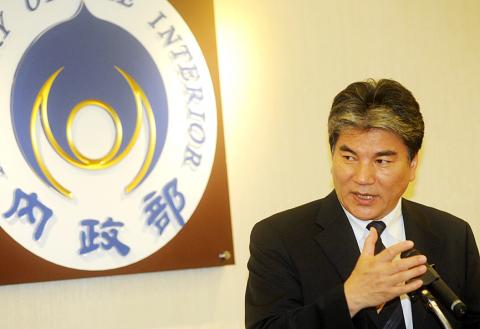Following a series of controversial decisions concerning urban renewal projects, the Ministry of the Interior (MOI) has drafted amendments to the Urban Renewal Act (都市更新條例) — as the minister promised in March — aimed at better protecting the rights of property owners.
“To eliminate controversies surrounding urban renewal, after three conferences, five law-revision panel meetings and nine Cabinet meetings we have come up with a series of amendments to the Urban Renewal Act that we hope will go some way toward protecting the rights of all stakeholders,” Minister of the Interior Lee Hong-yuan (李鴻源) told a press conference at the ministry yesterday.
“Forty-eight out of 67 articles in the current law will be revised, 17 new clauses are to be added, while one article is to be removed,” he added.

Photo: Wang Yi-sung, Taipei Times
At present, the law only offers minimal protection to property owners, especially those who are the subject of an urban renewal project.
For instance, the value of property is currently estimated by real estate appraisers hired by the construction firm that initiates the renewal project; a property owner opposed to an urban renewal -project is given just one opportunity to object; and as long as two thirds of land or property owners in a certain area agree to the project, the properties of those who are opposed to it can be seized by force, regardless of their owners’ wishes.
“In the draft amendments, the value of property has to be determined by appraisers hired by both the construction firm, or whoever initiates the project, and property owners, based on the estimated increased property value after the renewal,” he said. “The threshold for approval has also increased — four-fifths of the land or property owners involved must express consent before a project can now be approved.”
In addition, land or property owners will be given more opportunities to express their opposition to a project and when there is dispute, the courts will have the final say, Lee said.
Construction and Planning Agency Director-General Yeh Shih-wen (葉世文) said that while the current law leaves it to the initiator of a urban renewal project — usually a construction firm — and property owners to resolve their disputes, the proposed amendments would include government and court intervention if the two sides fail to come to a mutually acceptable solution.
Urban renewal issues attracted considerable public attention in March when the homes of the Wang (王) family in Taipei’s Shilin District (士林) were demolished to make way for a construction firm-initiated urban renewal project, despite the strenuous objections of the family.
The Taipei City Government said the Wangs did not express their opposition soon enough and were thus considered to have legally consented to the project. Also, because three-fourths of the -residents in the area agreed to it, the opposition of the Wangs was legally invalid.
The forced demolition of their properties, which came after physical clashes between more than 1,000 police officers and as many as 400 supporters of the Wang family, triggered a public outrage.
The city government later admitted there were “deficiencies” with the urban renewal law and the minister promised to come up with amendments to be presented to the legislature.

‘DENIAL DEFENSE’: The US would increase its military presence with uncrewed ships, and submarines, while boosting defense in the Indo-Pacific, a Pete Hegseth memo said The US is reorienting its military strategy to focus primarily on deterring a potential Chinese invasion of Taiwan, a memo signed by US Secretary of Defense Pete Hegseth showed. The memo also called on Taiwan to increase its defense spending. The document, known as the “Interim National Defense Strategic Guidance,” was distributed this month and detailed the national defense plans of US President Donald Trump’s administration, an article in the Washington Post said on Saturday. It outlines how the US can prepare for a potential war with China and defend itself from threats in the “near abroad,” including Greenland and the Panama

The Chinese Nationalist Party (KMT) is maintaining close ties with Beijing, the Democratic Progressive Party (DPP) said yesterday, hours after a new round of Chinese military drills in the Taiwan Strait began. Political parties in a democracy have a responsibility to be loyal to the nation and defend its sovereignty, DPP spokesman Justin Wu (吳崢) told a news conference in Taipei. His comments came hours after Beijing announced via Chinese state media that the Chinese People’s Liberation Army’s Eastern Theater Command was holding large-scale drills simulating a multi-pronged attack on Taiwan. Contrary to the KMT’s claims that it is staunchly anti-communist, KMT Deputy

RESPONSE: The government would investigate incidents of Taiwanese entertainers in China promoting CCP propaganda online in contravention of the law, the source said Taiwanese entertainers living in China who are found to have contravened cross-strait regulations or collaborated with the Chinese Communist Party (CCP) could be subject to fines, a source said on Sunday. Several Taiwanese entertainers have posted on the social media platform Sina Weibo saying that Taiwan “must be returned” to China, and sharing news articles from Chinese state media. In response, the Mainland Affairs Council (MAC) has asked the Ministry of Culture to investigate whether the entertainers had contravened any laws, and asked for them to be questioned upon their return to Taiwan, an official familiar with the matter said. To curb repeated

Myanmar has turned down an offer of assistance from Taiwanese search-and-rescue teams after a magnitude 7.7 earthquake struck the nation on Friday last week, saying other international aid is sufficient, the National Fire Agency said yesterday. More than 1,700 have been killed and 3,400 injured in the quake that struck near the central Myanmar city of Mandalay early on Friday afternoon, followed minutes later by a magnitude 6.7 aftershock. Worldwide, 13 international search-and-rescue teams have been deployed, with another 13 teams mobilizing, the agency said. Taiwan’s search-and-rescue teams were on standby, but have since been told to stand down, as